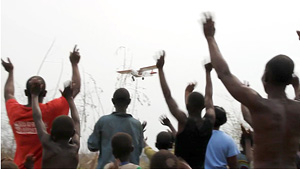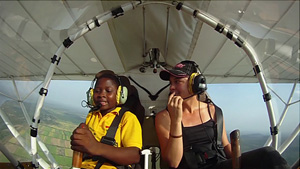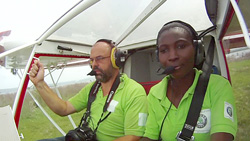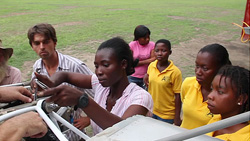Senegal Airlines, the new national carrier of the West African country, launched a new route from its Dakar (DKR) base on 15 August. The airline now flies via Abidjan (ABJ) in Ivory Coast to Douala (DLA) in Cameroon. Flights operate twice-weekly with the airline’s 136-seat A320 aircraft. Between Dakar and Abidjan, competition comes from Kenya Airways’ three weekly flights.
Monday, August 22, 2011
Saturday, August 20, 2011
Patricia Mawuli Nyekodzi:Ghana’s first female pilot
 |
| Add caption |
Lake Volta, the world's largest artificial lake, gives Medicine on the Move access to many remote villages by floatplane. The Akosombo Dam supplies hydroelectric power to Ghana, but the flooding of the lake cut off ground transportation to rural communities around it. Mawuli Nyekodzi said people in these villages often don’t know about principles of water sanitation, and practices such as throwing cow dung in wounds sometimes result in amputations or gangrene. Spending several hours with people in a village can help them take control of their health.
 |
| Add caption |
Airshow performer Melissa Pemberton joined Mawuli Nyekodzi and others for the latest Fly Me Day. She said she found out about the work at Kpong and Mawuli Nyekodzi’s determination in an email from Medicine on the Move founder Jonathan Porter.
 |
| Add caption |
“For me, right inside me, I thought that’s where I belong,” she said. While no other woman had earned Ghana’s national pilot certificate, Mawuli Nyekodzi started training.
 |
| Add caption |
“They shouted, ‘Oh you, come here, come and help us!’ And I went over there and I helped them,” she explained. She watched what the builders did to secure the wing and did the same. They were impressed with her proficiency and attention to detail—that she had quickly grasped the mechanical principles to secure the wing properly, just as she had taken to pulling up stumps.
 Patricia Mawuli Nyekodzi was cutting trees in the bush of her home country, Ghana, when she saw the airplanes flying low overhead.
Patricia Mawuli Nyekodzi was cutting trees in the bush of her home country, Ghana, when she saw the airplanes flying low overhead.
The aircraft piqued her interest but frightened her. She had never seen an airplane come so close. Why were they chasing her?
She hid, but the image of those aircraft stayed with her. Mawuli Nyekodzi set out to the nearby Kpong Airfield one day and asked why the airplanes had been chasing her. They weren’t, the workers at the airfield told her; they were practicing touch-and-goes,
she later recalled.
she later recalled.
Now able to get a good look at the airplanes on the field, Mawuli Nyekodzi knew she wanted to be around them somehow. She asked if there was anything she could do there as she waited for her results from school, and was given a cutlass and mattock to pull out tree stumps and cut the grass on the field. Physical labor like that is typically men’s work in Ghana, but Mawuli Nyekodzi jumped into it without hesitation.
“Where I come girls are not … associated with pulling out tree stumps and things like that—it’s a job for boys,” she told AOPA. “So I just went in there and I did it. Being around the planes—that’s all I wanted.”
Her hard work paid off. Mawuli Nyekodzi earned her private ultralight pilot certificate on her twenty-first birthday to become the first woman to earn the West African country’s national pilot certificate and is now an aircraft builder, Rotax technician, and flight instructor. The 23-year-old Ghana native is grateful for the opportunities she had at Kpong and gives back by teaching other young women to build, maintain, and fly airplanes; she also flies volunteer missions for the medical charity Medicine on the Move.
Stumps to crankshafts
Mawuli Nyekodzi tackled the strenuous tasks of pulling up stumps and clearing brush with characteristic verve, erasing doubts that a woman could keep up with the men. Medicine on the Move founder Jonathan Porter wrote when Mawuli Nyekodzi earned her certificate that she took to the job with seeming ease:
“The male staff members tried to compete ... I do mean tried, because they really struggled to keep up with her—and some abandoned the competition!”
Kpong Airfield, the largest private airport in Ghana, hosts Medicine on the Move and the aviation facility that supports it, Waasps. (The facility’s name originally came from the effort to get the operation approved, West African Aviation Solutions Proposal.) Mawuli Nyekodzi watched Waasps engineers assemble Zenith aircraft on the field as she worked. One day she saw them lifting a wing to put on an airplane and had an opportunity to help.
Within months of her start clearing brush on the field, Mawuli Nyekodzi had started a three-year apprenticeship as a trainee aircraft technician. Her work at Waasps—earning her Rotax certification, building and maintaining Zenith airplanes—paved the way for other young women to follow the same path. Porter said it is because of Mawuli Nyekodzi that the group at Kpong formed the Aviation Technology (AvTech) Academy, an aircraft building and maintenance school that is geared toward young women.
Waasps has completed six Zenith aircraft, with four under construction. Mawuli Nyekodzi speaks fondly of the STOL aircraft, which can land in as little as 20 meters (66 feet)—an asset in a country that according to the CIA World Factbook has only 11 airports in 92,000 square miles. She loves to service the Rotax engines, she said—especially the carburetors. She looks forward to outfitting one of the Zeniths with floats.
“For me, these are my babies,” she said.
‘Where I belong’
While working at Waasps, Mawuli Nyekodzi got a chance to join her boss on a short ferry flight. He let her take the controls, and once she had a taste of flying she never looked back.
After about six months of training, Mawuli Nyekodzi said, she was ready for her general flying test. But before she got a chance to head over to the airplane, she said, the examiner shouted that aircraft was on fire. Dismayed, she started crying—but she responded appropriately to what turned out to be a simulated emergency.
“I ran with my tears and I went for the fire extinguisher, and he said, ‘Now you have passed one stage of the test,’” she said.
Learning to fly in Ghana’s tropical climate calls for special attention to the weather, so Mawuli Nyekodzi had experience making a “no go” decision when ominous clouds started to build. A storm was brewing during her checkride, but she stayed aloft long enough meet the 90-minute requirement for her certificate. She came back to the airfield and greased the landing, she said, with camera crews waiting to document her accomplishment. It was her twenty-first birthday.
Now that she had earned her certificate, why couldn’t others? Mawuli Nyekodzi shares her love of flying at Fly Me Days, similar to a Young Eagles event, where she and others take people up for brief flights to introduce them to aviation.
“These short flights will just open their minds, give them an idea to be able to think about it and to see whether they want a career in aviation,” she said.
“Obviously, I was blown away by her story,” she said. She and her husband, Rex, spent a month with Medicine on the Move. She said what most impressed her was the perseverance of the workers at Medicine on the Move, and how much they had to work to take each step: building the airfield, establishing infrastructure, earning a pilot certificate.
“They’re nonstop all day, every day,” she said. Rex produced a documentary, The Calling, about Medicine on the Move.
Because Medicine on the Move had invested in her, Mawuli Nyekodzi gives back by flying volunteer missions for the organization, which transports health educators to isolated communities in Ghana. The STOL Zeniths and an X-Air on floats allow volunteer pilots to access remote villages in as little as 20 minutes when driving there might take a whole day, Mawuli Nyekodzi said.
On a typical mission, Mawuli Nyekodzi overflies the village to let the people know she has arrived. People assemble at the shore of Lake Volta, and some paddle out to the floatplane to welcome the guests. Health workers can spend as much as six hours with people in a village during one trip, she said.
“We want to be able to educate these people—not to just go and change their culture, but to encourage them to use what they have to help themselves so they can improve on their health,” she said.
Empowerment seems to be a theme at Kpong Airfield, where Porter said 22 pilot certificates have been issued. Mawuli Nyekodzi now teaches young women at AvTech and instructs in the aircraft she builds and maintains. Pilots there celebrated the “Centennial of Licensed Women Pilots” in 2010 with an event in which 97 women and girls got a chance to fly. In an area where people doubted if a woman could fly—or pull out stumps, or build airplanes—Porter said three girls are following in Mawuli Nyekodzi’s footsteps. She’s thrilled at the opportunity to teach them.
“When I got my license, I told myself if I have got this, it means other people can do this at the same time,” she said.
Thursday, August 18, 2011
Air Nigeria to link Lagos to Sao Tome and Principe
Sao Tome, Sao Tome and Principe, 18 Aug – Air Nigeria is due Thursday to launch air links between Lagos and the capital of Sao Tome, with stop offs in Douala, Cameroon and Libreville, Gabon, an airline representative told Macauhub Thursday.
Américo Cabral, the representative of the Nigerian airline in Sao Tome, said that the new route linking the four African countries in the Gulf of Guinea would be operated using a Boeing 737 with capacity for 116 passengers and be run twice a week, on Tuesdays and Thursdays.
Cabral said tickets would cost between US$300 and US$400 and that services related to the new Air Nigeria route in Sao Tome would be provided by Island Tour – Travel Logistic, GSA, a travel and tourism agency.
The Air Nigeria representative in Sao Tome noted that, “the launch of these air routes aims to promote trade, tourism and business between the four African countries in the Gulf of Guinea.”
Wednesday, August 10, 2011
Air Zimbabwe: Hundreds stranded in China for weeks
OVER 200 Air Zimbabwe passengers have been stranded in China for the past two weeks after the airline’s pilots went on strike demanding unpaid salaries, officials said on Monday.
The pilots have vowed not to return to work until they are given US$200,000 each as full payment of arrears and salaries pending from last year.
Air Zimbabwe, which is struggling with $100 million debts, will be paying the stranded passengers’ hotel bills until it starts servicing the route.
“The situation is that we have not been flying to China for the past two weeks,” Air Zimbabwe acting chief executive officer Innocent Mavhunga said.
“We have been accommodating the passengers in hotels and those who we can re-route we are doing so. The cost varies from one hotel to another.”
The strike has affected some of the airline’s international services besides domestic and regional flights which have also been cancelled.
This is not the first time this year the pilots have downed tools.
They went on strike in January demanding to be paid their outstanding salaries and allowances.
They also embarked on another job boycott on March 22.
Saturday, August 6, 2011
Air Zimbabwe pilots wants $200 000 to return to work
Air Zimbabwe pilots and management were yesterday still deadlocked over outstanding salaries and allowances. This was amid indications the strike by the pilots had impacted heavily on the airline's revenue.
The strike by the cockpit crew enters its seventh day today.
Air Zimbabwe acting chief executive Mr Innocent Mavhunga last night confirmed there was no headway over the matter because there was no money to pay the pilots.
"There is nothing yet because we still don't have the money but we are hoping that maybe by Wednesday (today) the board and the shareholder will come up with something.
Mavhunga said management, the board and the shareholder are trying their level best to solve this issue and in the meantime negotiations are continuing.
Mr Mavhunga said the strike was a major blow to the national airline, which was still trying to recover from the previous strike.
From the previous strike Air Zimbabwe lost about $5 million per month and this time around it is likely to go up.
Air Zimbabwe is currently incurring losses of about $3,5 million per month because of its bloated staff against generated income.
The national airline has already indicated it would cut its staff to around 409. Currently the airline employs over 1 300 workers. The pilots say they want $200 000 for them to return to work.
The strike by the cockpit crew enters its seventh day today.
Air Zimbabwe acting chief executive Mr Innocent Mavhunga last night confirmed there was no headway over the matter because there was no money to pay the pilots.
"There is nothing yet because we still don't have the money but we are hoping that maybe by Wednesday (today) the board and the shareholder will come up with something.
Mavhunga said management, the board and the shareholder are trying their level best to solve this issue and in the meantime negotiations are continuing.
Mr Mavhunga said the strike was a major blow to the national airline, which was still trying to recover from the previous strike.
From the previous strike Air Zimbabwe lost about $5 million per month and this time around it is likely to go up.
Air Zimbabwe is currently incurring losses of about $3,5 million per month because of its bloated staff against generated income.
The national airline has already indicated it would cut its staff to around 409. Currently the airline employs over 1 300 workers. The pilots say they want $200 000 for them to return to work.
Friday, August 5, 2011
Etihad Airways puts on more flights from Manchester Airport
Etihad Airways has reached what it calls a duo of "significant milestones" at Manchester Airport.
Earlier in the week (August 2nd), the airline announced that it would now be operating 14 services each week from the north-west travel hub to its base in Abu Dhabi.
This is in addition to the 21 return flights that it runs from Heathrow Airport.
The other milestone announced this week by the national airline of the United Arab Emirates is that it has opened a new maintenance facility in Manchester - its second in England - which will help to create more jobs for local people.
All scheduled and non-schedule line upkeep will be conducted at the facility, with an expert team boasting 50 years' experience between them employed to manage the operations.
Etihad Airways vice-president for maintenance Jeff Wilkinson said: "Our investment in Manchester illustrates the remarkable growth of the airline, our ambition to bring key services in-house in markets we operate to and also to recruit locally."
In 2010, the airline was awarded the top slot in the World's Best First Class category by travellers voting in the annual Skytrax survey.
Earlier in the week (August 2nd), the airline announced that it would now be operating 14 services each week from the north-west travel hub to its base in Abu Dhabi.
This is in addition to the 21 return flights that it runs from Heathrow Airport.
The other milestone announced this week by the national airline of the United Arab Emirates is that it has opened a new maintenance facility in Manchester - its second in England - which will help to create more jobs for local people.
All scheduled and non-schedule line upkeep will be conducted at the facility, with an expert team boasting 50 years' experience between them employed to manage the operations.
Etihad Airways vice-president for maintenance Jeff Wilkinson said: "Our investment in Manchester illustrates the remarkable growth of the airline, our ambition to bring key services in-house in markets we operate to and also to recruit locally."
In 2010, the airline was awarded the top slot in the World's Best First Class category by travellers voting in the annual Skytrax survey.
Thursday, August 4, 2011
Ethiopian plane crash report still pending
An official report on the Ethiopian Airlines crash off Beirut that claimed 90 lives is due to appear later this year, nearly 22 months after the disaster took place.
Public Works and Transport Minister Ghazi Aridi said Wednesday a final report on the circumstances of the crash, minutes after taking off from Rafik Hariri International Airport in January 2010, would soon be released.
“We have all the information. And we’re quite sure it’s accurate,” Aridi said during a news conference at the airport, adding that his ministry would receive the joint investigation committee’s final draft on Aug. 10.
After that, he explained, the committee would have a period of 60 days to issue a final report.
“We cannot unilaterally announce the content as we are only a part of the investigation committee,” Aridi said, warning that “if any [further] delay happens … we will present the results.”
The joint investigation committee, managed by Lebanon’s Civil Aviation Authority, is composed of Lebanese and Ethiopian representatives, along with individuals representing Boeing, the plane’s manufacturer.
But well-informed sources told The Daily Star that Aridi had been informed by a member of the investigation committee that the final report would not be finalized before “at least one month, if not more.”
The plane crashed into the Mediterranean less than four minutes after takeoff, after performing two maneuvers ordered by Beirut’s Air Traffic Control team. All 90 people aboard were killed.
Data contained in flight recorders retrieved from the crash site show how the aircraft turned slightly immediately after leaving runway 21, before being instructed to bank reasonably hard to its left.
It was during this move that the plane got into trouble, plunging 8,000 feet (2,432 meters) before disappearing from radar screens.
A statement aiming at presenting the different stages of the investigation’s advancement since Feb. 10 – when the last report was issued – was released during the conference.
The report said the investigation committee had recently received three reports on the analysis of the trim tab part of the plane’s rear, in an operation conducted in cooperation with the U.S. National Transportation Safety Board, and were expecting the final report to be release Aug. 10.
The NTBS also analyzed black spots found near the hot air exits of the auxiliary power unit, and discovered the spots weren’t caused by fire or hot temperature but oil.
The report also stated that the French Bureau of Investigations and Analysis for Civil Aviation’s Safety, working in cooperation with Boeing, were unable to recover a damaged segment on one of the retrieved five cockpit voice recorders.
During a news conference in February, Aridi had already said he knew the causes of the crash, but was waiting for an agreement between the Lebanese Civil Aviation Authority, Ethiopian Airlines and Boeing to be finalized before releasing the ministry’s final report.
At the time, he said a full analysis into the causes behind flight ET409’s crash would be available before the end of July.
The minister said he wanted “to assure people that our commitment [to finding out exactly what happened] will not be abandoned.”
“We call on the Lebanese to be patient and to avoid drawing conclusions,” he added.
Tuesday, August 2, 2011
Air Zimbabwe grounded again following strike by pilots
A strike by Air Zimbabwe pilots entered its third day on Monday, crippling operations at the national flag carrier.
Pilots walked off the job on Friday after negotiations over salaries and allowances broke down. The airline’s regional manager for the UK and America, David Mwenga told SW Radio Africa he had been advised that as of Monday no agreement had been reached between the pilots, the airline board and management team. Mwenga said that “discussions between the stakeholders are ongoing with a view to get the pilots back to work.”
This is the second time in a month that pilots at the national airline have gone on strike demanding unpaid salaries and allowances for June and July.
The strike has left hundreds of passengers stranded on all its regional and international routes. Air Zimbabwe operates a daily Harare-Johannesburg route, a twice-weekly flight to London and a weekly flight to Beijing as its only international routes. All flights from the capital have been suspended due to the strike while the airline was forced to re-schedule some of its other flights.
The industrial action by the pilots is one of many to hit Air Zimbabwe in the last year alone. Two months ago, the airline was forced to cancel its flights to London and South Africa after fuel suppliers demanded up front cash payments until the carrier settled its debts. Apparently, the carrier owed US$1.6 million to fuel suppliers.
In May, 18 of its flights came to a halt for a week as the aircraft it was leasing from Zambezi Airlines was withdrawn over an unpaid US$460 000 debt. It is believed the national airline is crippled with more than US$100 million of debt, some of it accrued from a nearly month long strike between March 22 and April 20.
Subscribe to:
Posts (Atom)






